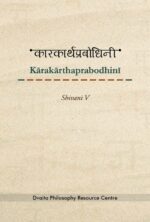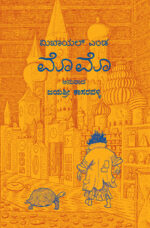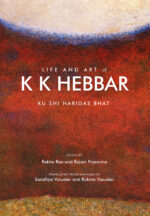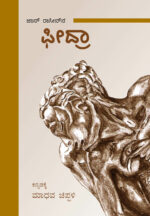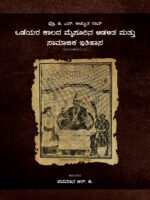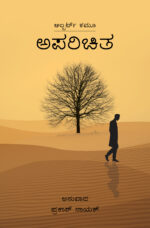Humanitarianism and Democracy (Maanava Dharmah – Prajaaprabhutvam Cheti Shatakadvayam)
₹240.00
Author: M V Nadkarni
These Satkarnas are Prof Nadkarni’s passionate plea for an authentic democratic order which guarantees the rights of every citizen while each citizen participates in it being fully aware of his / her duties. The complementarity of rights and duties is shown to be the essence of genuine democracy.
Interested customers may write to us at mup@manipal.edu about purchasing the book.
| Also available on |
| Category: | Texts in Translation |
|---|
| Author | |
|---|---|
| Format |
Related products
-
Christa Shaka 1800 Ra Modalina Mysooru ithihaasa
₹295.00Author: D S Achuta Rao Translator: S Narendra Prasad
೧೮೦೦ ಕ್ರಿ. ಶ. ದ ಹಿಂದಿನ ಮೈಸೂರು ಇತಿಹಾಸವು ಪ್ರೊ. ಡಿ ಎಸ್ ಅಚ್ಯುತ ರಾವ್ ಅವರ ಜೀವನ ಮತ್ತು ಕೆಲಸದ ಬಗ್ಗೆ. ಮೈಸೂರು ಇತಿಹಾಸದ ಕುರಿತಾದ ಅವರ ಸಂಶೋಧನೆಯು 1940-65ರ ಅವಧಿಯಲ್ಲಿ ಅವರು ಪ್ರಕಟಿಸಿದ ಹತ್ತು ಸೂಚ್ಯಂಕ ಲೇಖನಗಳಿಂದ ಪ್ರತಿನಿಧಿಸುತ್ತದೆ. ಅವರು ಭಾರತದ ಇತಿಹಾಸ ಮತ್ತು ಅದರ ಅದ್ಭುತ ಭೂತಕಾಲವನ್ನು ಸಕ್ರಿಯವಾಗಿ ಜನಪ್ರಿಯಗೊಳಿಸಿದರು. ಮಹಾರಾಜಾಸ್ ಕಾಲೇಜ್ ಹಿಸ್ಟರಿ ಸೊಸೈಟಿ, ಭಾರತದ ವಸಾಹತು ಸಂಶೋಧಕರು ಮತ್ತು ಕನ್ನಡ ವಿಶ್ವಕೋಶದಲ್ಲಿ ಮೈಸೂರು ಸರ್ಕಾರದ ಉಪಕ್ರಮದಿಂದ ಭಾರತೀಯ ಇತಿಹಾಸದಲ್ಲಿ ಉಪಕ್ರಮಗಳನ್ನು ಪ್ರಸ್ತುತಪಡಿಸುವುದರಿಂದ ಅಂತಹ ಮೂರು ಲೇಖನಗಳನ್ನು ಸೇರಿಸಲಾಗಿದೆ. ಎರಡನೇ ಭಾಗದಲ್ಲಿ ಅವರ ಜೀವನಚರಿತ್ರೆಯಲ್ಲಿ, ಅವರ ವಿದ್ಯಾರ್ಥಿಗಳು ಮತ್ತು ಮಕ್ಕಳು ಶಿಕ್ಷಕ ಮತ್ತು ತಂದೆಯಾಗಿ ಅವರ ಜೀವನದ ಬಗ್ಗೆ ಬರೆದಿದ್ದಾರೆ, ಅವರ ಅವಧಿಯ ಸಂದರ್ಭವನ್ನು ಒದಗಿಸಿದ್ದಾರೆ. ಪುಸ್ತಕವು ಕಳೆದ ಶತಮಾನದ ಮಧ್ಯದಲ್ಲಿ ಇತಿಹಾಸ ಸಂಶೋಧನೆಗೆ ಆಸಕ್ತಿದಾಯಕ ವಿಂಡೋವನ್ನು ಪ್ರಸ್ತುತಪಡಿಸುತ್ತದೆ.
Interested readers may write to us at mup@manipal.edu about purchasing the book.
-
Karakarthaprabodhini
₹345.00Author: Shivani V
Kaumudī (water lily) is the primer to study Sanskrit grammar, yet an ardent reader might find it a maze to untangle from its complexities. There is a need of Kaumudī (moonlight) to blossom it and show the light to reach its core. Kārakārthaprabodhinī is such an attempt. Kāraka, a factor that determines the relation between verb and the constituent words of a sentence, enables the reader to understand the intent of the sentence and thus critical discourses too. The Sanskrit grammatical texts and discourses have elaborated on the subtleties of Kāraka. Due to its profundity, there was a need for a lucid writing for the scholars and students for easy comprehension, which can be a reference book. Dr Potti made this possible for the Malayalam readers. Dr Shivani presents it for the Sanskrit fraternity too, with an introduction by Dr Varakhedi.
Interested customers may write to us at mup@manipal.edu about purchasing the book.
Also available on

-
MOMO
₹450.00Author: Michael Ende ,Translator: Jayashree Kasaravalli
The fantasy novel originally written in German and translated into English, has been enjoyed by millions of readers worldwide. It has now been translated into Kannada as well. The novel has a very unusual story about time. The story describes how people in the modern era use the time, and a girl named MOMO teaches how it should be used. Humans have stolen time from modern societies, and a little girl of mysterious origin brings it back. In today’s society, the story has timeless relevance.
ನಗರದ ಅಂಚಿನಲ್ಲಿ ಹಾಳುಬಿದ್ದಿದೆ ಒಂದು ಆಂಪಿ ಥೀಯೇಟರ್. ಅಲ್ಲಿರುವ ದಿಕ್ಕಿಲ್ಲದ ಪುಟ್ಟ ಹುಡುಗಿ ಮೊಮೊ. ಒಂದು ದಿನ ಬೂದು ಬಣ್ಣದ ಬಟ್ಟೆ ತೊಟ್ಟು ದುಷ್ಟರು ಸದ್ದಿಲ್ಲದೇ ಬಂದು ನಗರವನ್ನು ಆಕ್ರಮಿಸಿಕೊಳ್ಳುತ್ತಾರೆ. ಅವರನ್ನು ಹಿಮ್ಮೆಟ್ಟಿಸುವ ಶಕ್ತಿಯಿರುವುದು ಮೊಮೊಗೆ ಮಾತ್ರ. ಅವಳು ಪ್ರೊಫೆಸರ್ ಹೋರಾ ಮತ್ತು ಅವರಲ್ಲಿರುವ ವಿಚಿತ್ರ ಆಮೆಯ ನೆರವಿನಿಂದ ಕಾಲದ ಸರಹದ್ದುಗಳನ್ನು ದಾಟಿ ಆ ದುಷ್ಟರ ಒಳಸಂಚುಗಳನ್ನು ಬಯಲುಮಾಡುತ್ತಿದ್ದಾಳೆ. ‘ಮೊಮೊ’ ಕಾಲವನ್ನು ಕದಿಯುವವರ ಕಥೆಯಾಗಿರುವ ಜೊತೆಗೇ ಕದ್ದ ಕಾಲವನ್ನು ಮತ್ತೆ ಜನರಿಗೆ ತಂದುಕೊಡುವ ಒಂದು ಮಗುವಿನ ಸಾಹಸಮಯ ಕಥೆಯು ಆಗಿದೆ.
Interested customers may write to us at mup@manipal.edu about purchasing the book.
-
Saga of The Uprooted
₹95.00Author: Ranga Hari, Translator: Saratchandra Shenoi
This English translation of Visthapanachi Katha, a Konkani Khanda Kavya, depicts the saga of the migration of the Konkani community from Goa to a land far away from home. This collection of poems encapsulates the reign of a colonial power over the region of Goa that began with the entry of the Portuguese in the 16th century. It illustrates the displacement of the Konkani people and their resurgence at Cochin port. The poems describe the transformation of Goa – both culturally and topographically – and the people of Goa who were plundered, displaced, uprooted, and were forced to strip off their culture and identity. The poet is unfolding the tale of his very own ancestors by tracing out these events and graphically portraying the plight of the Konkani people. Saratchandra Shenoi, the author of this English translation, is a multilingual translator and a Sahitya Akademi Award winning (Antarnad – 1999) Konkani poet based in Kochi. He has over twenty books to his credit which include collections of poetry, works of fiction and non-fiction, translations, edited anthologies and language guides. Ranga Hari is the author of the Konkani original text titled Visthapanachi Katha. He has written more than twenty-five books in different languages, and was associated with Bharatiya Sikshan Mandal and Vidya Bharati.
Interested readers may write to us at mup@manipal.edu about purchasing the book.
-
Life and Art of K K Hebbar
₹2,000.00Author: Haridas Bhat Editors: Rekha Rao, Rajani Prasanna Translators: Sandhya Vasudev, Rukma Vasudev
K K Hebbar was a trailblazer in Indian art. His contributions to modern Indian art as an artist, teacher, and art administrator are unparalleled. What is ‘Indian’ in modern Indian art has been a subject of discussion since the beginning of the modernist movement. Hebbar’s oeuvre is an answer to that question. It is modern and yet, intensely Indian, both in terms of subjects and treatment. Hebbar remained rooted in his native soil. His line drawings are a treasure of Indian art. No one has surpassed them in their delicacy and lyricism.
This biography is Mr Bhat’s affectionate account of his friend Hebbar’s life and art. The strength of Hebbar’s character comes through in his narration. Integrity and self-discipline were Hebbar’s defining qualities. Arguably, the man was greater than his work. And that makes his story intriguing. This biography of a major artist is a welcome addition to the meagre literature on Indian artists.
Interested customers may write to us at mup@manipal.edu about purchasing the book.
Also available on

-
Phedra
₹180.00Translator: Madhava Chippalli
ರಾಸೀನ್ನ ಫೀದ್ರಾ ನಾಟಕವು ಪಾಶ್ಚಿಮಾತ್ಯ ನಾಟಕ ಸಾಹಿತ್ಯದಲ್ಲೇ ಒಂದು ಆಯಕಟ್ಟಿನ ಕೃತಿ. ಗ್ರೀಕ್ ಮತ್ತು ಎಲಿಜಬೆಥನ್ ನಾಟಕಗಳಲ್ಲಿ ಕಾಣಸಿಗದ ಹೊಸ ಬಗೆಯ ಮನೋಲೋಕವೊಂದನ್ನು ತನ್ನ ಪಾತ್ರಗಳಿಗೆ ಧಾರಣೆ ಮಾಡಿಸಿದ ಈ ನಾಟಕವು ಆ ಮೂಲಕವೇ ಈ ಪರಂಪರೆಯಲ್ಲಿ ಮನೋವಿಜ್ಞಾನಕ್ಕೆ ಒಂದು ಖಾಯಂ ಸ್ಥಾನವನ್ನು ಒದಗಿಸಿಕೊಟ್ಟಿತು. ಮುಂದೆ ಬಹುತೇಕ ಪಾಶ್ಚಿಮಾತ್ಯ ನಾಟಕಗಳು ಈ ಪರಂಪರೆಯನ್ನು ಮುಂದುವರಿಸಿದವು; ರಂಗಭೂಮಿಯಲ್ಲೂ ಮನೋಲೋಕವನ್ನು ಮುಂದಕ್ಕೆ ತರುವ ವಿಭಿನ್ನ ಪ್ರಯೋಗಗಳಿಗೆ ಈ ಪರಂಪರೆಯು ಚಾಲ್ತಿ ನೀಡಿತು. ಈ ಸಂಪ್ರದಾಯಕ್ಕೆ ವಿರೋಧಿಯಾದ ಫ್ರಾನ್ಸಿನ ಪ್ರಸಿದ್ಧ ರಂಗಕರ್ಮಿ ಆಂತೋನಿನ್ ಆರ್ತೋನ ಮಾತುಗಳನ್ನು ಕೇಳುವುದಾದರೆ, ಪಾಶ್ಚಿಮಾತ್ಯ ರಂಗಭೂಮಿಯಲ್ಲಿ ‘ಸೈಕಾಲಜಿಯ ದುರ್ಬೀಜ’ ಬಿತ್ತಿದ ಕೃತಿ ಇದು! ಹಾಗಿರುವುದರಿಂದ, ನಾವು ಈ ನಾಟಕವನ್ನು ಹೇಗೇ ಓದಲಿ, ಓದದೆ ಇದ್ದರೆ ಅಷ್ಟರ ಮಟ್ಟಿಗೆ ಪಾಶ್ಚಾತ್ಯ ನಾಟಕ ಸಂಪ್ರದಾಯದ ಅರಿವು ಅಪೂರ್ಣ. ಅಂಥ ಪ್ರಮುಖ ನಾಟಕವೊಂದು ಇನ್ನೂ ಕನ್ನಡಕ್ಕೆ ಬಾರದೆ ಉಳಿದಿತ್ತು; ಆ ಲೋಪವನ್ನು ಈ ಅನುವಾದವು ಸಮರ್ಥವಾಗಿಯೇ ತುಂಬಿಸಿದೆ. ಮೂಲದ ನಿಷ್ಠೆಯೊಂದಿಗೆ ಭಾಷಾಗಾಂಭೀರ್ಯ ಮತ್ತು ಮಾತಿನ ಸುಭಗತೆ ಎರಡನ್ನೂ ಒಟ್ಟಿಗೇ ಹಿಡಿಯಲು ಯತ್ನಿಸಿರುವ ಈ ಅನುವಾದವನ್ನು ನಾನು ತುಂಬು ಮನಸ್ಸಿನಿಂದ ಸ್ವಾಗತಿಸುತ್ತೇನೆ.
Interested readers may write to us at mup@manipal.edu about purchasing the book.
-
Wodeyara Kaalada Mysurina Adalitha matthu Saamajika Ithihasa
₹600.00Author: Pavamana R D, D S Achuta Rao
ವಿಜಯನಗರ ಸಾಮ್ರಾಜ್ಯದ ಉತ್ತರಾಧಿಕಾರಿಗಳೆಂದು ಹೆಸರಾಗಿರುವ ಮೈಸೂರಿನ ಒಡೆಯರು ಕರ್ನಾಟಕದ ಇತಿಹಾಸಕ್ಕೆ ನೀಡಿದ ಕೊಡುಗೆ ಅನನ್ಯವಾದುದು. ರಾಜಕೀಯ ರಂಗದಲ್ಲಿ ಮಾತ್ರವಲ್ಲದೆ, ಸಾಂಸ್ಕೃತಿಕ, ಸಾಹಿತ್ಯಿಕ ಹಾಗೂ ಕಲಾರಂಗಗಳಲ್ಲೂ ಮೈಸೂರು ಅರಸರು ವಿಜಯನಗರದ ಶ್ರೇಷ್ಠ ಪರಂಪರೆಯನ್ನು ಮುಂದುವರೆಸಿದರು. ರಾಜಒಡೆಯರ್, ರಣಧೀರ ಕಂಠೀರವ, ಚಿಕ್ಕದೇವರಾಜ ಒಡೆಯರ್ ಅವರ ಆಳ್ವಿಕೆಯ ಕಾಲಘಟ್ಟದಲ್ಲಿ ಮೈಸೂರು ಸರ್ವಾಂಗೀಣ ಪ್ರಗತಿ ಸಾಧಿಸಿತು. ಈ ವಂಶದ ಮೊದಲ ಪ್ರಮುಖ ಅರಸು ರಾಜ ಒಡೆಯರ್ರಿಂದ ಆರಂಭಿಸಿ ಮೈಸೂರು ಆಂಗ್ಲರ ಅಧೀನವಾಗುವವರೆಗಿನ ಆಡಳಿತ ಹಾಗೂ ಸಾಮಾಜಿಕ ಇತಿಹಾಸ ಇಲ್ಲಿದೆ. ಮೈಸೂರು ಸಂಸ್ಥಾನದ ಎರಡು ಮಹತ್ವಪೂರ್ಣ ಶತಮಾನಗಳ ಕಾಲದ ಆಡಳಿತ, ಕಂದಾಯ ನೀತಿಗಳು, ನ್ಯಾಯಾಡಳಿತ, ಸೈನ್ಯ ವ್ಯವಸ್ಥೆ, ಪ್ರಾಂತೀಯ ಹಾಗೂ ಸ್ಥಳೀಯ ಆಡಳಿತ, ಸಾಮಾಜಿಕ ಜೀವನ ಹಾಗೂ ಧರ್ಮ, ಶಿಕ್ಷಣ, ಸಾಹಿತ್ಯ, ಕಲೆ ಮತ್ತು ವಾಸ್ತುಶಿಲ್ಪ ಮತ್ತು ಆಸ್ಥಾನ ಸಂಸ್ಕೃತಿ ಹೀಗೆ ಬಹುಮುಖೀ ನೆಲೆಗಳ ವಿಸ್ತಾರವಾದ, ಅಧ್ಯಯನಪೂರ್ಣ ಸಂಶೋಧನಾ ವರದಿಯಾಗಿ ಇದು ಸ್ವಾತಂತ್ರೋತ್ತರ ತಲೆಮಾರಿನ ವಿದ್ವಾಂಸರ ಸಂಶೋಧನಾ ವೈಖರಿಗೆ ಒಂದು ಅತ್ಯುತ್ತಮ ಉದಾಹರಣೆ ಎನ್ನಬಹುದು. ಕರ್ನಾಟಕದ ಅದರಲ್ಲೂ ಮೈಸೂರಿನ ಒಡೆಯರ ಇತಿಹಾಸದ ಬಗೆಗೆ ಸಂಶೋಧನೆಗಳು ಇನ್ನೂ ಕಣ್ತೆರೆಯುತ್ತಿದ್ದ ಕಾಲದಲ್ಲಿ ಡಿ. ಎಸ್. ಅಚ್ಯುತರಾಯರ ಈ ಸಂಶೋಧನ ಕಾರ್ಯ ಮಹತ್ವಪೂರ್ಣವಾದುದು. ಅಂದಿಗೆ ಲಭ್ಯವಿದ್ದ ಎಲ್ಲಾ ಬಗೆಯ ಮೂಲ ಹಾಗೂ ಆನುಷಂಗೀಕ ಆಕರಗಳನ್ನು ಬಳಸಿಕೊಂಡು, ಸಂಶೋಧನೆಯ ಎಲ್ಲಾ ಚೌಕಟ್ಟಿನೊಳಗೆ ವಸ್ತುನಿಷ್ಠವಾಗಿ ರೂಫುಗೊಂಡಿದೆ ಈ ಕೃತಿ. ಸಾಮಾಜಿಕ ಇತಿಹಾಸವನ್ನು ಪುನರ್ ರೂಪಿಸುವಾಗಲಂತೂ ಸಮಕಾಲೀನ ಸಾಹಿತ್ಯದ ಎಲ್ಲಾ ರೂಪಗಳನ್ನೂ ಇಲ್ಲಿ ಬಳಸಿಕೊಳ್ಳಲಾಗಿದೆ. ಅಗತ್ಯ ವಿರುವೆಡೆಯಲ್ಲಿ ಒಂದಕ್ಕಿಂತ ಹೆಚ್ಚಿನ ಸಂಖ್ಯೆಯಲ್ಲಿನ ಉಲ್ಲೇಖಗಳು, ಟಿಪ್ಪಣಿಗಳೂ, ವಿವರಣೆಗಳೂ ಈ ಸಂಶೋಧನೆಯ ಮೌಲ್ಯವನ್ನು ಹೆಚ್ಚಿಸಿವೆ. ಸಂಶೋಧನೆಗೆ ಪೂರಕವಾಗಿ ಗ್ರಂಥಋಣ, ನಕ್ಷೆಗಳು, ಸಂಕ್ಷೇಪಾಕ್ಷರಗಳು ಹಾಗೂ ಒಡೆಯರ ವಂಶಾವಳಿ ನೀಡಲಾಗಿದೆ. ಆಧಾರಗಳ ಮೇಲಿನ ಟಿಪ್ಪಣಿಯು ಸಂಶೋಧಕರಿಗೆ ತಮ್ಮ ಕಾರ್ಯಕ್ಷೇತ್ರದ ಮೇಲಿನ ಒಡೆತನದ ದ್ಯೋತಕ. ಅಪಾರ ಸಂಖ್ಯೆಯ ಹಸ್ತಪ್ರತಿಗಳ ಮತ್ತು ಶಾಸನಗಳ ಬಳಕೆ ಈ ಕೃತಿಯ ಹೆಗ್ಗಳಿಕೆ.
Interested readers may write to us at mup@manipal.edu about purchasing the book.
-
Aparichita
₹170.00Translator: Prakash Nayakತರ್ಕವಾಗಲೀ ವಿಜ್ಞಾನವಾಗಲೀ ಮೂಲತಃ ಯಾವ ಅರ್ಥವನ್ನೂ ಅಡಗಿಸಿಕೊಂಡಿರದ ಈ ಅಸಂಬದ್ಧ ಬದುಕನ್ನು ವಿವರಿಸಲಾರವು. ಆದರೆ, ಅದಕ್ಕಾಗಿ ಅತೀಂದ್ರಿಯ ಶಕ್ತಿಯೊಂದನ್ನು ನಂಬುವುದು `ತಾತ್ವಿಕ ಆತ್ಮಹತ್ಯೆ’. ಇಂತಹ ತಾತ್ವಿಕ ಅಥವಾ ದೈಹಿಕ ಆತ್ಮಹತ್ಯೆಗಳು ಜಗತ್ತಿನ ಅರ್ಥರಾಹಿತ್ಯಕ್ಕೆ ಉತ್ತರಗಳಲ್ಲ. ಅಸಂಬದ್ಧತೆಯನ್ನು ಗುರುತಿಸಿ ಬದುಕುವುದೊಂದೇ ಅದಕ್ಕಿರಬಹುದಾದ ಉತ್ತರ ಎಂದು ವ್ಯಾಖ್ಯಾನಿಸಿದ ಫ್ರೆಂಚ್ ಲೇಖಕ, ತತ್ವಜ್ಞಾನಿ ಮತ್ತು ಪತ್ರಕರ್ತ ಆಲ್ಬರ್ಟ್ ಕಮೂ ಬರೆದಿರುವುದು ಕೆಲವೇ ಕಾದಂಬರಿಗಳು ಮತ್ತು ಕೆಲವು ವ್ಯಾಖ್ಯಾನಗಳು. ಇಪ್ಪತ್ತನೆಯ ಶತಮಾನದ ಅತ್ಯಂತ ಪ್ರಭಾವಶಾಲಿ ಲೇಖಕರಲ್ಲಿ ಒಬ್ಬನಾದ ಅಲ್ಬರ್ಟ್ ಕಮೂನ ಸುಪ್ರಸಿದ್ದ ಕಾದಂಬರಿ “ದ ಸ್ಟ್ರೇಂಜರ್” ಕನ್ನಡವೂ ಸೇರಿದಂತೆ ವಿಶ್ವದ ಹಲವು ಭಾಷೆಗಳಲ್ಲಿ ಅನುವಾದಗೊಂಡು ಹಲವು ಪೀಳಿಗೆಗಳ ಓದುಗರನ್ನು ವಿವಿಧ ರೀತಿಗಳಲ್ಲಿ ಆಕರ್ಷಿಸುತ್ತ ಬಂದಿದೆ. ೧೯೪೨ರಲ್ಲಿ ಮೊದಲು ಪ್ರಕಟವಾದ ಈ ಫ್ರೆಂಚ್ ಕಾದಂಬರಿ ಕಳೆದ ಎಂಟು ದಶಕಗಳಲ್ಲಿ ಪಡೆದುಕೊಂಡಿರುವ ವಿಮರ್ಶಾತ್ಮಕ ಪ್ರತಿಕ್ರಿಯೆ- ಪ್ರತಿಸ್ಪಂದನೆಗಳೂ ವೈವಿಧ್ಯಮಯವಾಗಿವೆ. ಪ್ರತಿವೊಂದು ಪೀಳಿಗೆಯೂ ಈ ಕೃತಿಯನ್ನು ಹೊಸದಾಗಿ ಓದುತ್ತ, ಅನುವಾದಿಸಿಕೊಳ್ಳುತ್ತ, ವಿಮರ್ಶಿಸುತ್ತ, ಇಂಥ ಅನುವಾದಗಳ, ವ್ಯಾಖಾನಗಳ ಒಂದು ಪರಂಪರೆಯೇ ಸೃಷ್ಟಿಯಾಗಿದೆ. ಕನ್ನಡದಲ್ಲಿ ಈ ಮೊದಲೇ, ೧೯೭ ೦ರಲ್ಲಿ, “ಅನ್ಯ” ಎಂಬ ಹೆಸರಿನಲ್ಲಿ ಡಾ. ಡಿ. ಎ. ಶಂಕರ್ ಅವರಿಂದ ಅನುವಾದಗೊಂಡಿದ್ದ ಈ ಕಾದಂಬರಿಯು ಅರ್ಧ ಶತಮಾನದ ನಂತರ ಮತ್ತೆ “ಅಪರಿಚಿತ” ಎಂಬ ಹೆಸರಿನಿಂದ ಶ್ರೀ ಪ್ರಕಾಶ್ ನಾಯಕ್ ಅವರಿಂದ ಹೊಸದಾಗಿ ಅನುವಾದಗೊಂಡು ಈ ಪರಂಪರೆಯನ್ನು ಮುಂದುವರಿಸಿದೆ. ಸ್ವತಃ ಓರ್ವ ಪ್ರತಿಭಾವಂತ ಕತೆಗಾರ-ಕಾದಂಬರಿಕಾರರಾಗಿರುವ ಪ್ರಕಾಶ್ ನಾಯಕ್ ಅವರ ಈ ಸರಳ ಸುಂದರ ಅನುವಾದವು ಕಮೂ ಕೃತಿಯ ಮರು ಓದು-ಹೊಸ ಓದುಗರನ್ನು ಆಹ್ವಾನಿಸುವಂತಿದೆ.Interested customers may write to us at mup@manipal.edu about purchasing the book.
Also available on




